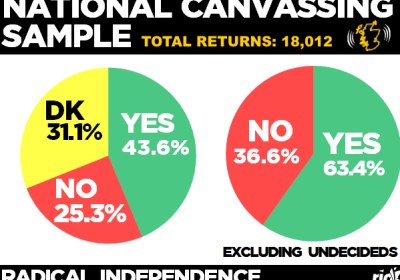-
In Place of Fear II: A Socialist Programme for an Independent Scotland By Jim Sillars Vagabond Voices Publishing, 2014 www.inplaceoffear.com Jim Sillars is a well-known and well-respected figure on the Scottish political scene. Elected a Labour Party MP for South Ayrshire in 1970, he shifted away from mainstream Labour Party politics due to his commitment to setting up a Scottish Parliament in Edinburgh.
-
 The Radical Independence Campaign released the largest public canvass sample in the referendum to-date on August 19 (see graphic). The findings are in stark contrast to the official polling companies, and show that communities all over Scotland are simply not swallowing Project Fear. Having been failed by decades of Westminster rule, and now facing the Tory cuts, privatisation and austerity, people are increasingly looking towards a Yes vote as a platform for social change.
The Radical Independence Campaign released the largest public canvass sample in the referendum to-date on August 19 (see graphic). The findings are in stark contrast to the official polling companies, and show that communities all over Scotland are simply not swallowing Project Fear. Having been failed by decades of Westminster rule, and now facing the Tory cuts, privatisation and austerity, people are increasingly looking towards a Yes vote as a platform for social change. -
 Former British prime minister, and current United Nations’ Middle East “peace envoy”, Tony Blair has an insatiable appetite for cuddling up to despots and tyrants. This time it is Egypt's dictator, Abdel Fattah al-Sisi, responsible for the mass murder of more than 1000 peaceful demonstrators.
Former British prime minister, and current United Nations’ Middle East “peace envoy”, Tony Blair has an insatiable appetite for cuddling up to despots and tyrants. This time it is Egypt's dictator, Abdel Fattah al-Sisi, responsible for the mass murder of more than 1000 peaceful demonstrators. -

We know it was the biggest protest in world history. We know that millions of people who'd never before felt like they could make their voices heard by taking action, marched in the streets of 800 cities to say “Not In Our Name”; that they dared hope for peace, but were committed by their governments to a bloody and illegal war.
-

Hundreds of thousands of South African demonstrators marched through Cape Town on August 9 to protest against Israel’s military assault on Palestinians in Gaza, Morning Star Online said the next day.
-

Jan Woolf is the cultural coordinator of the No Glory in War campaign, a group that seeks to counter the celebratory narrative of the British government’s commemorations of World War I. She spoke to online radical cultural Red Wedge Magaize about the campaign’s use of art and media — both past and present — to communicate its message.
-
Palestine solidarity activists in Britain declared victory on August 4 after the National Executive Council of the Nation Union of Students voted to pass a motion in solidarity with Palestine, and for an arms embargo against Israel, Electronic Intifada reported the next day. The NEC motion condemned Israel’s lethal assault on and blockade of the Gaza Strip.
-
Palestine solidarity protesters burned their TV licences in front of BBC Bristol’s HQ on July 28 in protest at the broadcaster’s biased coverage of Israel’s onslaught on Gaza. Peace activists began their occupation of BBC Bristol’s grounds on July 23. The act of civil disobedience came after campaigners handed a dossier to BBC bosses providing examples of biased reporting of Israel’s war on the Palestinians. It came after the BBC issued “notice to quit” letters in past couple opf days threatening court action if the protesters don’t end their “illegal occupation.”
-

For the second consecutive Saturday, a huge demonstration took place for Gaza in London on 26 July.
-
Ireland: Sports fans fly flags for Gaza Dublin Gaelic Athletics Association fans unfurled a huge banner reading “Free Gaza” during the Leinster Senior Football Final on July 20, while Palestinian flags were flown by crowds at other sporting events across the country.
-
British Prime Minister David Cameron may want a politics-free Commonwealth Games in Glasgow, but campaigners have railed against sponsors’ links to deaths and human rights abuses at home and abroad. The Tory PM told business leaders on a jaunt to Glasgow University on July 23 that he wanted to steer clear of politics as the clock wound down to the games opening ceremony. A crowd of protesters thronged outside the university library where he spoke, with picketers ranging from the Radical Independence Coalition to Our People’s National Health Service.
-
 With tanks rolling through the outskirts of Gaza and the Israeli Defense Force organises new air strikes targeting hospitals and civilians playing football on the beach, almost 100 protests took place right across the world on July 19 and 20, calling for an end to the brutal occupation of Palestine and the bombing of Gaza.
With tanks rolling through the outskirts of Gaza and the Israeli Defense Force organises new air strikes targeting hospitals and civilians playing football on the beach, almost 100 protests took place right across the world on July 19 and 20, calling for an end to the brutal occupation of Palestine and the bombing of Gaza.
Britain
Britain